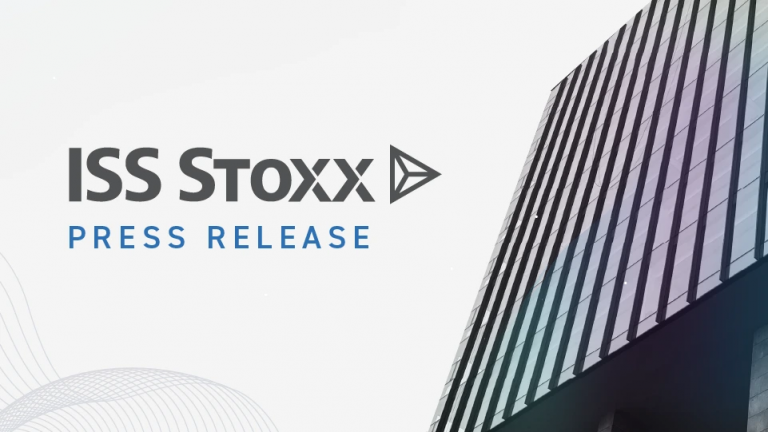The latest regulatory developments related to ESG and stewardship worldwide.
This monthly bulletin produced by ISS STOXX’s Regulatory Affairs & Public Policy group provides a review of regulatory developments that may be relevant to investors and companies.

ISSB
International Financial Reporting Standards Foundation Publishes Inaugural Jurisdictional Guide for International Sustainability Standards Board Standards
In May, the International Financial Reporting Standards (IFRS) Foundation published their Inaugural Jurisdictional Guide for the adoption or other use of ISSB Standards. The guide was developed in response to the growing number of jurisdictions introducing local market-specific factors into their disclosure frameworks when adopting the International Sustainability Standards Board (ISSB) IFRS S1 and S2 disclosure standards. The guide addresses how such additions can be made in a manner that ensures consistency and comparability across jurisdictions.
IFRS Foundation and African Development Bank Announce Joint Projects to Support Sustainability-Related Financial Disclosures
On May 28, the IFRS Foundation and the African Development Bank (AfDB) signed a letter of intent to collaborate on projects to advance sustainability-related disclosures in Africa. Signed during the AfDB’s annual meeting, the letter outlines how the two organizations can promote capacity building throughout the region by engaging with African financial institutions, lawmakers, and regulators and providing technical support and training materials on how to develop sustainability disclosure in line with ISSB Standards. Nigeria and Kenya have already signaled their intent to utilize or adopt the ISSB Standards.
GRI
Global Reporting Initiative Opens Consultation on Digital, Structured Reporting Framework
On June 18, the Global Reporting Initiative (GRI) opened a consultation on their proposed sustainability reporting “taxonomy.” The digital taxonomy will utilize XBRL, a standardized digital format for organizing and sharing information, to allow companies to organize, tag, and classify their sustainability-related disclosure. The fully digital platform will expedite research and comparison across different regulatory frameworks and make reporting and accessing sustainable disclosures more cost-effective and efficient. The GRI’s consultation is open until August 11, 2024, and seeks input from experts in XBRL and sustainability disclosures.
GHG Protocol
Greenhouse Gas Protocol Announces Collaborative Partnership with IFRS Foundation
On June 24, the Greenhouse Gas (GHG) Protocol and IFRS Foundation signed a memorandum of understanding formalizing their relationship. The GHG Protocol and the IFRS Foundation work closely together as the GHG Protocol Corporate Standard is integrated into the IFRS S-2 Climate-related Disclosures. The new memorandum states the commitment of the two organizations to ensure ongoing compatibility between their respective standards and their aim to reduce costs for reporting entities. According to the memorandum, the ISSB will be integrated into the decision-making process for updates to, and the broader development of, the GHG Protocol Corporate Standard, thereby allowing for increased compatibility between the organizations’ work.
SBTi
Science Based Targets Initiative Unveils Suite of Criteria Updates and New Resources
On May 28, the Science Based Targets initiative (SBTi) released several revisions and resources to support financial institutions in setting ambitious emission reduction targets. The SBTi’s suite of updates is centered around their Financial Institutions’ Near-Term Criteria Version 2.0 (FINT Criteria V2). The FINT Criteria V2, which will come into effect on November 30, contains criteria and recommendations for the setting of near-term targets aligned with the objectives of the Paris Agreement. Amongst other changes, the new version reduces the target time frame of emissions reduction targets and increases minimum Scope 1 and 2 GHG targets to 1.5°C alignment. The SBTi is also working to develop a Financial Institutions Net-Zero Standard for near- and long-term targets.
UNEP FI
United Nations Environment Program Finance Initiative Publishes Report on Physical Climate Risk Management
In May, the United Nations Environment Program Finance Initiative (UNEP FI) published a report on “managing physical climate-related risks in loan portfolios.” The report, produced by the UNEP FI Risk Center, is meant to serve as a guide for retail banks to review their current practices, understand the global landscape, and learn approaches to manage and minimize the physical climate risks in their portfolio.

Japan
Japan Financial Services Agency Announces Publication of Action Program for Corporate Governance Reform 2024
On June 7, the Japan Financial Services Agency (JFSA) announced the publication of the “Action Program for Corporate Governance Reform 2024: Principles into Practice.” The Action Program was prepared by the JFSA’s Council of Experts Concerning the Follow-up of Japan’s Stewardship Code and Japan’s Corporate Governance Code. The Action Program follows up on several governance-related topics and proposes future initiatives for “self-motivated” improvements to corporate governance in Japan. Specifically, the publication proposes improving stewardship practices, board director quality and independence, disclosure and dialogue between corporates and global investors, environmental issues, and how to encourage management to consider sustainability issues.
Singapore
Bank for International Settlements and Monetary Authority of Singapore Develop Outline of Climate Risk Platform for Financial Authorities
On June 12, the Bank for International Settlements (BIS) and the Monetary Authority of Singapore (MAS) announced a jointly developed blueprint for financial authorities to identify, monitor, and manage different climate-related risks in the financial system. The blueprint was developed in the BIS Innovation Hub Centre in Singapore as part of Project Viridis – an initiative to explore how regulatory and climate data can be utilized to better understand financial climate-related risks. The joint publication outlines what features and metrics should be integrated into a climate-risk platform to avoid potential gaps and measurement issues as regulators assess physical and transition climate risks of individual banks and the financial system.
Hong Kong
Hong Kong Exchange Publishes Consultation on Proposed Enhancements to Corporate Governance Code
On June 14, the Hong Kong Stock Exchange (HKEX) published a consultation paper on proposed changes to the exchange’s Listing Rules and Corporate Governance Code. The key proposed changes include reforms to board effectiveness, such as mandatory provisions relating to overboarding, board performance reviews, annual director training, which board members are considered independent, board gender diversity, internal risk management systems, and board dividend decision disclosure. The deadline to respond to the consultation is August 16, and certain provisions, such as a ban on single-gender boards, are proposed to be effective from the end of 2024.
Malaysia
Bursa Malaysia Launches ESG Disclosure Platform for Malaysian Companies
On June 21, Bursa Malaysia released their Centralised Sustainability Intelligence (CSI) Solution to help Malaysian companies “boost their overall competitiveness” by integrating ESG factors into their business strategies. The CSI Solution “facilitates ESG disclosures by companies” through tools designed to assess emissions across corporate value chains and make sustainable reporting more efficient. The CSI Solution is described as an integral part of the Malaysian government’s strategy to decarbonize its economy.
Australia
Australian Treasury Publishes Sustainable Finance Roadmap
On June 19, the Australian Treasury released their Sustainable Finance Roadmap, which outlines the future implementation of sustainability-related financial reforms. The roadmap is segmented into three key pillars: improving transparency on climate and sustainability; assessing and enhancing financial system capabilities; and the Australian Government’s sustainability-related leadership and engagement. The roadmap contains a detailed timeline for key reforms, including the development or implementation of climate-related financial disclosures, a sustainable finance taxonomy, and sustainable investment product labels.
Australian Securities & Investments Commission Grants Class No-Action Position for Second-Party-Opinion Providers
On June 14, the Australian Securities & Investments Commission (ASIC) issued a two-year class no-action position regarding the need for second-party-opinion (SPO) providers to hold Australian Financial Services (AFS) licenses. The position states that “ASIC does not intend to take action for a contravention of the requirement to hold an AFS license… in relation to providing an SPO in connection with an offer to wholesale clients that involves the provision of financial product advice,” but sets minimum regulatory expectations for SPO providers.
New Zealand
Financial Markets Authority and External Reporting Board Jointly Publish Guides on Climate-Related Disclosures
On June 19, the New Zealand Financial Markets Authority (FMA) and External Reporting Board (XRB) published two guides on understanding and navigating the country’s Climate-related Disclosures (CRD) regime. The first guide – “What You Need to Know”– outlines the purpose of climate-related disclosure; what disclosure is legally required; related considerations and context relating to climate disclosure; and the role of different agencies in the disclosure process. The second guide – “Navigating Climate Statements” – provides detailed information on how to understand, compare, and contextualize the disclosure in companies’ climate statements.

European Union
European Supervisory Authorities Publish Final Reports on Greenwashing
On June 4, the European Securities and Markets Authority (ESMA), the European Banking Authority (EBA), and the European Insurance and Occupational Pensions Authority (EIOPA) each published their final reports on “greenwashing” in the financial sector. All three reports examine the sustainable investment landscape in the European Union (EU) and globally in order to identify and better understand practices from financial market participants that may constitute “greenwashing.” In ESMA’s report, the regulator affirmed that they would continue their efforts to monitor for “greenwashing” risk and produce additional guidance for market segments where greenwashing risk is perceived to be high. ESMA also requested that the European Commission reinforce the mandates of ESMA and the National Competent Authorities (NCAs) to combat “greenwashing.”
European Supervisory Authorities Publish Joint Opinion on Improving Sustainable Finance Disclosure Regulation
On June 18, the three European Supervisory Authorities (ESAs) published a joint opinion containing recommendations for the review of the Sustainable Finance Disclosure Regulation (SFDR). The ESAs recommend the creation of a coherent categorization regime that would mitigate the risk of greenwashing. Specifically, the ESAs propose two voluntary product categories – “sustainable” and “transition” – with clear criteria, as well as a sustainability indicator that would grade financial products according to a scale. The joint opinion also covers disclosures for non-categorized products, definitional improvements, the need for consumer testing, and other technical suggestions.
European Insurance and Occupational Pensions Authority Publish Annual Report
On June 14, the European Insurance and Occupational Pensions Authority (EIOPA) published their annual report outlining 2023 strategy and achievements. In the report, the EIOPA outlines the work undertaken to close protection gaps and to improve their supervisory capabilities in the sustainable finance space. For example, in 2023 EIOPA developed a natural catastrophe dashboard, promoted climate-related adaption in underwriting practices, continued its consumer protection work in combatting greenwashing, and undertook an analysis of SFDR.
Council of the European Union Adopts Position on Green Claims Directive
On June 17, the Council of the European Union (the Council) adopted its ‘general approach’ on the Green Claims Directive. The Directive aims to combat “greenwashing” by setting “minimum requirements for the substantiation, communication and verification of explicit environmental claims.” The Directive covers all existing and future, public or private, environmental labelling schemes, as well as any voluntary green or environmental marketing claims. Under the proposed provisions, companies would have to use clear criteria and scientific evidence to verify environmental claims. The Council and the European Parliament are expected to begin negotiations on this legislative file in the upcoming legislative cycle.
Council Formally Adopts Nature Restoration Law
On June 17, the Council formally adopted legislation that will set specific and legally binding targets on ecosystem restoration throughout the EU. The legislation sets a 20% minimum restoration target for all EU land and sea areas by 2030. The Regulation calls on EU member states to prevent deterioration of areas that have already been restored or that host specific habitats protected by the Regulation. The law also includes several other preservation policy items – ranging from the planting of 3 billion additional trees to the protection of European pollinator populations.
European Financial Reporting Advisory Group and Task Force on Nature-related Financial Disclosures Publish Correspondence Mapping
On June 20, the European Financial Reporting Advisory Group (EFRAG) and the Task Force on Nature-related Financial Disclosures (TNFD) published a joint mapping of the alignment between TNFD recommendations and mandatory European Sustainability Reporting Standards (ESRS) disclosures. The mapping covers how all 14 TNFD recommendations, as well as many TNFD-recommended core metrics and disclosures, are integrated into the ESRS. The joint publication will help European companies in the scope of the Corporate Sustainability Reporting Directive (CSRD) understand the alignment of mandatory disclosures with the TNFD recommendations.
EFRAG Publishes New ESRS Technical Explanations on its Q&A Platform
On May 30, the EFRAG released a compilation of 68 explanations to market participants’ technical questions on the implementation of the ESRS disclosure standards. The EFRAG divided the explanations based on the topic and the specific disclosure requirement they address. The compilation was released on the ESRS Q&A Platform, first launched in 2023, and consisted of 44 new, and 24 previously announced, explanations.
EFRAG Publishes Three Implementation Guides on European Sustainability Reporting Standards
On May 31, the EFRAG published three Implementation Guidance documents addressing some of “the most challenging aspects of ESRS implementation.” The Implementation Guidance Documents cover materiality assessments, value chains, and ESRS datapoints, respectively. The documents are designed to aid undertakings and other stakeholders with their implementation of the ESRS by providing them with answers to frequently asked questions, simplifying the disclosure requirements with practical language, and helping them navigate which aspects of the standards are most relevant to them.
France
Autorité de la Concurrence Propose Informal Guidance Policy for Competition Questions in the Area of Sustainability
On May 27, the Autorité de la Concurrence (L’Autorité) [or, the Authority] – the French competition regulator – released a notice clarifying how French entities should consider competition concerns in the sustainability space. The notice explains the circumstances under which the European Commission has clarified that coordinated sustainability efforts would not constitute anti-competitive practices. L’Autorité encourages legal counsel for corporations to consider these laws in the implementation of their projects and has adopted an “open door policy” for undertakings with regards to any legal uncertainty. In the notice, L’Autorité outlines the conditions and procedures for undertakings to gather informal guidance on whether their sustainability projects violate competition laws.
Autorité des Marchés Financiers and Authorité de Contrôle Prudentiel et de Résolution Publish Progress Report on French Financial Participants’ Climate Commitments
On June 19, the Autorité des Marchés Financiers (AMF) and the Authorité de Contrôle Prudentiel et de Résolution (ACPR) published a joint report assessing how French financial market participants are adhering to their climate commitments. The report noted “progress” in banks’ and insurance companies’ “exit from coal financing,” including restrictions and exclusions relating to oil and gas. The report encourages banks to be more specific about their exclusion policies; insurance companies to disclose their liabilities’ exposure to fossil fuel; and investment managers to improve their transparency regarding the fossil fuel industry. The report also noted that investment managers’ communications on their voting policies and shareholder engagement initiatives have “improved significantly,” but requested they formalize their engagement transparency policies more fully.
By:
Noam Cherki, Associate, Regulatory Affairs & Public Policy, ISS STOXX
Hugo Gallagher, Senior Associate, Regulatory Affairs & Public Policy, ISS STOXX
Karina Karakulova, Director of Regulatory Affairs & Public Policy, ISS STOXX




